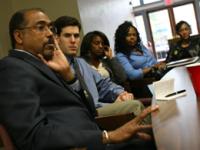
Feature Story
Metro TeenAIDS – keeping young people on the agenda in Washington DC
18 September 2009
18 September 2009 18 September 2009
UNAIDS Executive Director Michel Sidibé met with Metro TeenAIDS (MTA), a community health organization in Washington, DC dedicated to supporting young people to overcome the impact of AIDS. Credit: UNAIDS/Jati Lindsay
UNAIDS Executive Director Michel Sidibé met yesterday with Metro TeenAIDS (MTA), a community health organization in Washington, DC dedicated to supporting young people to overcome the impact of AIDS.
Currently, 1% of young people ages 13-24 in Washington, DC are confirmed to be living with HIV.
Metro TeenAIDS is the leading youth organization in the Washington DC-metro area focusing all its efforts on the prevention, education, treatment and the unique needs of young people around HIV. Its mission is to prevent the spread of HIV, promote responsible decision making and improve the quality of life for young people living with or affected by HIV. Metro TeenAIDS also provides HIV counseling and testing services to young people. In the last three months alone, over six hundred youth have been tested at MTA.
During his visit, Mr Sidibé met with Mr. Adam Tenner, Executive Director of Metro TeenAIDS, Metro TeenAIDS staff, as well as some of its youth staff who work as peer-educators. Metro TeenAIDS staff gave Michel Sidibé a tour of the facilities, including its youth center Freestyle which is currently being renovated, and took part in a lively roundtable discussion on HIV prevention with youth.
Together, they discussed MTA’s innovative programming, varying from youth leadership and advocacy, text messaging, internet outreach, and other new media social marketing campaigns. One member of the staff, Carmel Pryor, discussed REALtalk DC, a social marketing campaign that has been extremely successful in the District and includes a texting service for free testing information and HIV education.
Some youth and staff had recently traveled to South Africa on a work trip and discussed their experiences. “South Africa looks a lot different from DC, but it’s really, really the same in terms of the scope of the issues and how it affects community” said Nicole Styles, Outreach Coordinator.

During his visit, Mr Sidibé met with Mr Adam Tenner, Executive Director of Metro TeenAIDS, as well as peer-educators working in the program and with youth benefiting from their services. Credit: UNAIDS/Jati Lindsay
With Washington DC having the highest HIV prevalence of any city in the US, at a striking ten times the national average, Mr Sidibé underlined the importance of the work undertaken by Metro TeenAIDS to expand access to youth-friendly health services. “Young people are our window of opportunity. What do we do to accompany them to stay HIV free?” asked Mr. Sidibe.
“The HIV epidemic in the U.S. is part of the global AIDS response” said Mr Sidibé highlighting the fact that young people aged 15-24 account for 45% of new infections worldwide. One of the key priority areas in the UNAIDS outcome framework is empowering young people, and Mr. Sidibé reaffirmed UNAIDS’ commitment to genuine participation of youth in expanding international response to HIV.
Established in 1988, the Metro TeenAIDS has provided education programs and prevention resources to over 200 000 young people, affected family members as well as youth workers in Washington, Maryland and Virginia.
Metro TeenAIDS – keeping young people on the agen
Feature stories:
Michel Sidibé presents UNAIDS’ vision in Washington, D.C. (14 September 2009)
UNAIDS Forum on HIV, Human Rights and Men Who Have Sex with Men (17 September 2009)
External links:
Metro TeenAIDS (MTA)
Publications:
Joint action for results: UNAIDS outcome framework, 2009 – 2011(pdf, 396 Kb.)
Related
 “Who will protect our young people?”
“Who will protect our young people?”

02 June 2025


